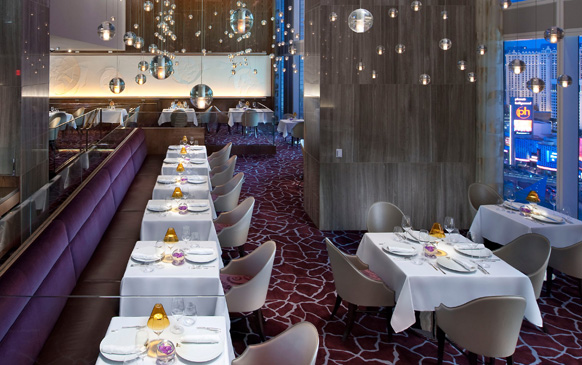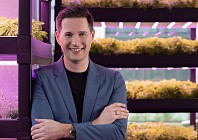Pierre Gagnaire is obsessed with food. Ever since he set foot in the kitchen of the Nelson restaurant in Saint-Étienne, where he got his first job as an errand boy in 1964, food has consumed the chef extraordinaire, proving to be a source of inspiration and exasperation for the last half a century. After embarking on his apprenticeship in Lyon in 1966 and subsequently serving in the French navy before hitchhiking from Quebec to Acapulco, Gagnaire settled down at his father’s Saint-Étienne restaurant Le Clos Fleuri — his first taste of Michelin stardom.
The young chef opened his first restaurant in 1981 and was awarded his own Michelin star the next year, and another by ’86. Gagnaire quickly learned to bend the strict rules of French cuisine, creating dishes that were so bold and daring that his second restaurant, also in Saint-Étienne, was awarded the coveted three-Michelin-star ranking in 1993. Bankruptcy in 1996 didn’t deter the chef for long, and he opened his next venture in Paris six months later, and his three stars were reinstated after just two years.
It’s evident when talking to him that Pierre Gagnaire is a man for whom food is not merely a part of his life, but the essence of it. Anyone who has ever eaten at any of Gagnaire’s 11 restaurants around the world will know the delight that accompanies each dish as it comes out of the kitchen — individual works of art designed to tease, surprise and tantalise all five senses. His creations are playful and whimsical, and yet so technically sophisticated as to leave the diner in awe, combining flavours, textures and colours that make the mind (and palate) boggle.

The language used on the chef’s website is the language of love; words such as tenderness, harmony, humility and rhythm appear frequently, and it’s no surprise to learn that he finds inspiration in jazz music, art and poetry — influences that are apparent in the presentation of his food. Here, Gagnaire talks about his favourite subject with a mixture of passion and melancholy, evoking both sadness and optimism for a new wave of French restaurants and chefs springing up across his native land.
French cuisine is very traditional, with techniques and styles perfected over many generations. Is the food scene in France changing at all?
Yes; the world is changing. There is a new generation in France that is clever and works very hard. In England you have this idea of the ‘gastropub’. What is a gastropub? It was the bistro in France 30 years ago. Now, this kind of bistro is coming back in France. Today you find small restaurants, not too expensive, with a chef who is in the kitchen and serves the food. Simple and tasty food. Now once again you have bistros in France. It’s true that we lost that for a couple of years, but this kind of restaurant is making a comeback.
Why do you think it has come back into fashion?
Because many young chefs don’t have much money and don’t have much time. It’s so hard to do [what I did]. I begin to work for myself 35 years ago and, at the start, I lost money. It was very complicated. You must be absolutely crazy to do that. But now, having a private life is very important for young people, and when you have a private life, you don’t spend time at work. You spend time with your family. My life is my work; it’s not a choice. When you want to do things of a high quality, you must be involved day and night, and many people don’t accept that. They do the job, they want to do well, but they need time for themselves and time for their children.
To be a chef of your standard do you think you have to be a little obsessed?
Totally. I have two sons your age. They don’t work like that. For them, the private life is very important. For myself, too, but finally, I chose work. I made the choice.
Are there fewer chefs who are so passionate these days?
No, people still have passion, but the passion is finished at the end of the day and on Sundays. It’s a different way of seeing work. Is it good or not good? We shall see. But I know that if you want the work and want to obtain real quality, you must be involved 100 per cent.
In many countries you see French fusion, but not in France, where cuisine remains traditional? Why is this?
It’s true. In France, we are in France. Of course we have different international restaurants, but there is no mixing, thankfully. There is more tradition and more savoir faire. Traditions are reflected in the quality of the young chefs that come up. Even if they learn different techniques later, they do their work honestly from the training.
Where is the best cuisine outside of France?
I don’t know, it’s difficult to say. You have very good chefs in Japan and very good chefs in America and Italy. But it is impossible to reason globally. Behind every restaurant, you have a man. Perhaps there is a fantastic chef in Greece and nobody knows him? At the end of the day, the most important thing is the man who does the cooking; the person who is in the kitchen, holding the pan.
Sketch in London just had a big refurbishment — how important is the design in the overall dining experience?
We opened Sketch in London years ago. At the beginning it was more like a club, but it has grown and now we made the choice to become a real restaurant; very comfortable and very creative in terms of decor. It’s a dangerous exercise; it’s expensive to do and complicated to manage, but people always want new, new, new. Ultimately, the experience is not the decor. You don’t eat the candle or the plates — you eat what is on the plate and that is what’s important. We must not forget the most important aspects are the taste, the product and the experience.
People today take a greater interest in healthy eating. How do you stay on top of that?
I have always approached it like that, even before the trend started. But it’s easy to talk about [eating well] and difficult to do. It’s very expensive, and at the same time there are more and more sandwich shops and more and more concepts with pizza. Where is the verity?
You have restaurants in 10 cities and you spend a lot of time travelling. When you are not in the kitchen, what do you enjoy about travel?
Spending time with my team. For me, that is the most important. And to spend time with myself. To have time to create and to keep the emotion and the energy. That is what’s really important.
What are the biggest challenges you face as a chef and restaurateur today?
To keep the quality and to grow. My ambition is not to be the best for six months or one year, it’s to stay on the stage for a long time. I have had three stars for 21 years. Since 21 years ago, we’ve had to keep up this kind of quality every day. When you think like that, you don’t think about money. You think about quality, quality, quality. It’s tiring but it’s a good challenge. Like that, your life is acceptable.










